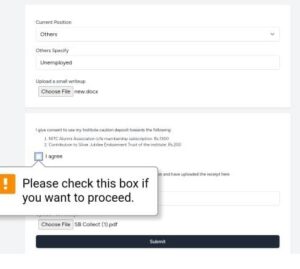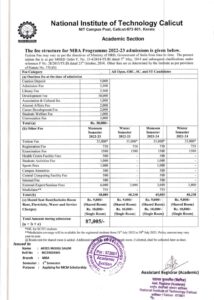NIT Calicut students are charged a mandatory lifetime membership fee for the alumni association. RTI revealed no such fee exists.
Published Jan 18, 2025 | 9:00 AM ⚊ Updated Jan 18, 2025 | 9:54 AM

Students at NITC are expressing dissatisfaction over what they perceive as a forced enrollment into the National Institute of Technology Calicut Alumni Association (NITCAA).
The National Institute of Technology Calicut (NITC) finds itself in the spotlight following allegations of questionable practices related to its alumni association (National Institute of Technology Calicut Alumni Association) membership.
A student, Afees Moidu Salim, brought to light the concerns of many, particularly postgraduate students, about the lack of transparency and ‘voluntary yet mandatory’ nature of alumni fees.
His journey of uncovering these issues through Right to Information (RTI) filings raised questions about the fairness of these practices.
Students at NITC resent what they perceive as forced enrollment into the National Institute of Technology Calicut Alumni Association (NITCAA).
While the institute charges a significant ₹2000 towards an “alumni affairs fund” during admission, students are later required to pay an additional ₹1300 for alumni membership and another ₹200 towards an alumni endowment fund when registering for the convocation.

The Mandatory Check Box
“We have already paid for the alumni affairs fund as part of our admission fees,” Afees explained. “Adding a separate membership fee at the end of our course feels excessive, especially since this charge was never disclosed upfront.”
Afees also highlighted how postgraduate students often do not engage with the alumni association as much as students in the B.Tech course, making the imposition of these fees particularly burdensome for them.
Afees’s persistence led him to file an RTI seeking clarity on the mandatory nature of NITCAA membership.
The response revealed that membership is not mandatory, contradicting the institute’s prior stance.
Despite this, students waiting for their academic certificates were compelled to tick a checkbox agreeing to the membership fee to proceed with their convocation registration.
“The checkbox appeared mandatory, and even after the institute declared it optional, students who refused membership faced delays in refunds,” Afees said.
“I waited four months to receive my caution deposit refund, and even then, I only received ₹3500 instead of the full ₹5000, with no explanation or response to my complaints.”
The RTI response further revealed that funds collected from students were being redirected to a private association, raising ethical and procedural concerns.
Beyond the alumni membership fee, students are required to pay ₹3300 to register for convocation, irrespective of attendance.

Fee Structure
This additional cost compounds the financial strain on students, some of whom are from families that struggle with the education expenses of children.
Afees’s efforts to escalate these issues met with repeated administrative silence. “I wrote to the assistant registrar, the registrar, and the Dean of Student Welfare, but I received no reply,” he said. “It’s disheartening to see such disregard for student concerns.”
Also read: Gaana — chronicling history as it happens: Genre of music with Chennai’s soul
The revelations sparked by Afees’s RTI filings highlight the urgent need for greater transparency and fairness in NITC’s fee structure.
Students are demanding clear communication about mandatory and optional charges, as well as accountability for the use of funds collected.

Copy of Complaint mail by a Student
NITC’s administration must address these grievances promptly to restore trust and ensure that financial policies do not place undue burdens on students.
When South First reached out to the Calicut NIT Alumni Affairs and International Relations office regarding the alleged deduction of funds from student fees without their consent, the office denied any such practice.
When this reporter mentioned the possibility of filing an RTI (Right to Information) request, the representatives refused to engage in further discussion.
Attempts to gain clarity from the Academic Wing of the institution also yielded no conclusive response. They requested additional time to investigate the issue, stating that, to their knowledge, no formal complaints from students had been received. However, contrary to this claim, several emails from students highlighting this issue have reportedly been sent to the concerned authorities.
As Afees’s case demonstrates, transparency and student advocacy are essential in fostering an equitable academic environment.
The unspoken rules of alumni membership are no longer hidden; and many students and ex-students await answers.
(Edited by Rosamma Thomas)
